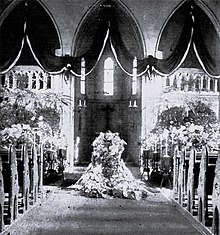Edvard Hjelt
Edvard Hjelt | |
|---|---|
 | |
| Born | 28 June 1855 |
| Died | 2 July 1921 (aged 66) |
| Nationality | Finnish |
| Alma mater | University of Helsinki |
| Scientific career | |
| Fields | Chemistry |
Edvard Immanuel Hjelt (28 June 1855 – 2 July 1921) was a
Early life and education
Hjelt was born in Vihti, Finland. He was the elder brother of
University rector
Hjelt served as vice rector of the University of Helsinki from 1896 till 1899 and as rector from 1899 till 1917. The political turmoil after the announcement of the
Political career
With the start of the First World War Hjeld saw a chance to gain independence from Russia after a defeat of Russia by Germany. Germany on the other hand would benefit from troop withdrawal from the frontline to deal with a Finnish uprising. His good relations with Germany allowed Hjelt to get in contact with leading military personnel to negotiate a German support for Finland. A small group of Finnish volunteers reached Germany via Sweden in 1915. Their training started in autumn 1915; at the end, the group of 2,000 men formed the
Hjelt signed a

Hjelt's strong connections to Germany and his animosity against France, made him no longer suitable as diplomat after the First World War, in which Germany lost most of its influence to France, the United States and Great Britain.[2]
Works
- Geschichte der organischen Chemie von der ältesten Zeit bis zur Gegenwart : mit 3 Figuren . Vieweg, Braunschweig 1916 Digital edition by the University and State Library Düsseldorf
